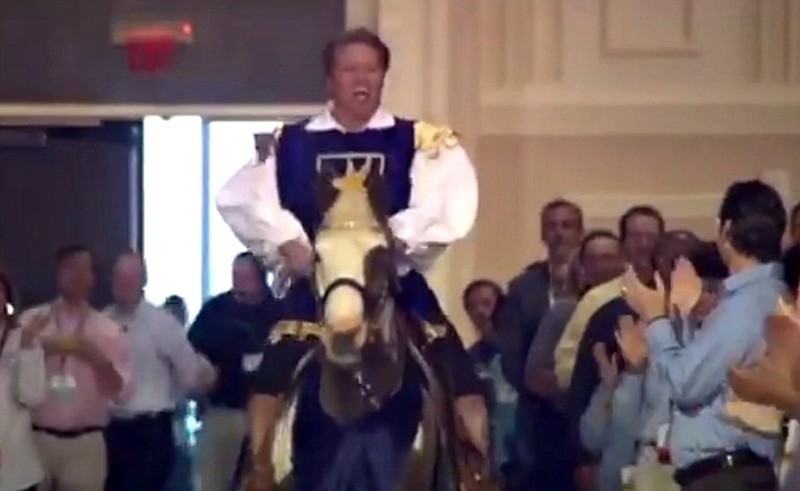In July, the U.S. Department of Justice filed a two-count indictment against Denver-based kidney-dialysis giant DaVita and its eccentric ex-CEO, Kent Thiry, in connection with what prosecutors described as a scheme to prevent rivals from raiding the company's top talent. But Thiry has some powerful allies, including the U.S. Chamber of Commerce, whose recently filed brief in the case provides a likely outline for the DaVita defense.
The Chamber's argument: "By purporting to declare a new per se criminal offense, the Department of Justice has usurped antitrust policy- and decision-making authority vested in Congress and the courts. What is more, criminally prosecuting practices not firmly established by courts as per se unlawful at the time the conduct occurred violates due process principles and contravenes a host of Supreme Court cases emphasizing the need for clarity in federal criminal prohibitions. Because no court has previously held that non-solicitation agreements are per se illegal, this prosecution falls far short of the fair notice that due process requires. The Court should dismiss the indictment."
The feds' case is the latest challenge to Thiry and DaVita. The tenth-largest employer in Denver, DaVita was memorably filleted by HBO's John Oliver, whose 2017 Last Week Tonight super-segment (it's 24 minutes long) noted lawsuit settlements totaling nearly $1 billion — and more complaints followed. Yet Thiry, who has denied wrongdoing in regard to the Justice Department's claims, still seriously considered running for governor of Colorado and collaborated with the man who got the job, Jared Polis, on an economic program addressing the COVID-19 pandemic last year; he also pushed successful redistricting amendments Y and Z.
Oliver described Thiry as a "showboating musketeer," and for good reason: Videos of company events show Thiry dressed in medieval garb while making splashy entrances; he rode in on a horse at one bash, and did tumbling moves to Bob Seger's "Old Time Rock & Roll" in another. The former Bain & Company powerhouse's choice of wardrobe was influenced by his love of the movie The Man in the Iron Mask, and he got a jolt out of getting his employees to chant "All for one and one for all."
Thiry stepped down as DaVita's CEO in 2019; he's currently serving as an advisor for KKR & Co. Inc., a global investment firm in New York City. But the Justice Department's indictment focuses on his previous gig. According to a July 15 DOJ release, the indictment "alleges that DaVita and Thiry both participated in two separate conspiracies to suppress competition for the services of certain employees. Count One charges DaVita and Thiry for conspiring with SCA [alleged co-conspirator Surgical Care Affiliates LLC] to allocate senior-level employees by agreeing not to solicit each other’s senior-level employees from as early as February 2012 until as late as July 2017. Count Two charges DaVita and Thiry for conspiring with another health care company from as early as April 2017 until as late as June 2019 to allocate employees by agreeing that the other health care company would not solicit DaVita’s employees."
In response, Thiry issued the following statement: "These allegations are false and rely on a radical legal theory about senior executive recruitment without precedent in U.S. history. The government took steps to ignore — and even hide — key evidence. The facts bear it out decisively: No antitrust violations occurred, these companies hired DaVita executives for years, and the companies are not competitors.”
The U.S. Chamber of Commerce brief fills thirteen pages with similar assertions. Its three major claims: "Defendants lacked the fair notice required by due process because no court has declared non-solicitation agreements to be per se illegal"; "DOJ 'guidance' classifying naked no-poaching agreements as per se illegal violates separation of powers and cannot provide the fair notice required by due process" and "a criminal rule-of-reason case is incompatible with due process, while limiting prosecutions to specific per se offenses provides certainty to businesses and consumers."
The Chamber's bottom line: "American businesses make millions of complicated economic decisions each and every day. They are entitled to clear notice from the lawgiver — not just from the prosecutor — of what
conduct is criminally out of bounds."
This promises to be a long, ugly and expensive fight. Click to read the Kent Thirty indictment and the U.S. Chamber of Commerce brief.
[
{
"name": "Air - MediumRectangle - Inline Content - Mobile Display Size",
"component": "12017618",
"insertPoint": "2",
"requiredCountToDisplay": "2",
"watchElement": ".fdn-content-body",
"astAdList": [
{
"adType": "rectangle",
"displayTargets": "mobile"
}
]
},{
"name": "Editor Picks",
"component": "17242653",
"insertPoint": "4",
"requiredCountToDisplay": "1",
"watchElement": ".fdn-content-body",
"astAdList": [
{
"adType": "rectangle",
"displayTargets": "desktop|tablet"
},{
"adType": "rectangle",
"displayTargets": "desktop|tablet|mobile"
}
]
},{
"name": "Inline Links",
"component": "18838239",
"insertPoint": "8th",
"startingPoint": 8,
"requiredCountToDisplay": "7",
"maxInsertions": 25
},{
"name": "Air - MediumRectangle - Combo - Inline Content",
"component": "17261320",
"insertPoint": "8th",
"startingPoint": 8,
"requiredCountToDisplay": "7",
"maxInsertions": 25,
"watchElement": ".fdn-content-body",
"astAdList": [
{
"adType": "rectangle",
"displayTargets": "desktop|tablet"
},{
"adType": "rectangle",
"displayTargets": "desktop|tablet|mobile"
}
]
},{
"name": "Inline Links",
"component": "18838239",
"insertPoint": "8th",
"startingPoint": 12,
"requiredCountToDisplay": "11",
"maxInsertions": 25
},{
"name": "Air - Leaderboard Tower - Combo - Inline Content",
"component": "17261321",
"insertPoint": "8th",
"startingPoint": 12,
"requiredCountToDisplay": "11",
"maxInsertions": 25,
"watchElement": ".fdn-content-body",
"astAdList": [
{
"adType": "leaderboardInlineContent",
"displayTargets": "desktop|tablet"
},{
"adType": "tower",
"displayTargets": "mobile"
}
]
}
]












